- Home
- Dan Simmons
The Guiding Nose of Ulfant Banderoz Page 3
The Guiding Nose of Ulfant Banderoz Read online
Page 3
“I do hear the storm,” said Shrue as he rose and signaled for Schmoltz’s daughter to clear away his things. He took the last of the Blue Ruin with him. “It makes me sleepy. I hope to join a caravan headed south in the morning, so I wish you a pleasant night’s sleep Ser…Faulcoom?”
He left Faucelme smiling and flexing his hands the way KirdriK was wont to do when he most wanted to strangle his master.
· · ·
Shrue woke at exactly two bells in the morning, just as he had hypnotically instructed himself to do, but for a few seconds he was confused by the warmth of another body in bed with him. Then he remembered.
Derwe Coreme had been waiting in his tiny room when he’d come upstairs and watched him coyly from where she lay naked under the covers. She held the covers low enough that Shrue had seen that the cold river air coming in through the open window was affecting her. “I’m sorry,” he’d said, hiding his surprise. “I haven’t had time to do the gender-changing spell.”
“Then I’ll have to show you how a woman-version of Shrue might begin to pleasure me,” said Derwe Coreme. As it turned out, Shrue now remembered, the former princess to the House of Domber had not been as averse to men as she might have thought.
Now he slipped out from under the covers, careful not to wake the softly snoring warrior, got rid of his rug merchant clothes and cap in a silent flash of blue vortex, and dressed himself silently in his most elegant dark-gray tunic, pantaloons, and flowing robe made of the rarest spidersilk. Then he jinkered the carpet to life, brought it to a hover four feet above the floor, and climbed aboard with his shoulder valise.
“Did you just plan to leave me a note?” whispered Derwe Coreme.
Shrue the diabolist had not stuttered since his youth—a youth lost in the tides of time—but he came close to doing so at that moment. “On the contrary, I planned to be back before dawn and to commence where we left off,” he said softly.
“Pawsh,” said the war maven and slipped out of the covers, dressing quickly in her dragonscale armor.
“I had no idea that Myrmazons and their leader wore nothing under their scales,” said Shrue.
“If blade or beam cuts through those scales,” said Derwe Coreme as she buckled up her high boots, “it’s best not to have any underlayers with foreign matter that might infect the wound. A clean wound is the best wound.”
“My approach to life exactly,” whispered Shrue as his carpet floated at the level of the war maven’s bare left breast. “May I drop you somewhere on my way?”
Derwe Coreme slipped on two daggers, a belt dirk, a throwing star, a hollow iberk’s horn for signaling, and her full sword and scabbard, slid them aside, and climbed on the floating rug just behind him. “I’m coming with you.”
“But I assure you, there is no need for…” began Shrue.
“There was no need for the three hours until we fell asleep,” said Derwe Coreme, “but they worked out all right. I’d like to see this so-called Ultimate Library and Final Compendium of Thaumaturgical Lore from the Grand Motholam and Earlier. For that matter, I’d like to meet this Ulfänt Banderōz I’ve heard so much about over the years.”
“Him…you might find disappointing,” said Shrue.
“So many men are,” said War Maven Derwe Coreme and put her arms around Shrue’s ribs as he tapped flight threads and maneuvered the jinkered carpet forward, out sixty feet above the river, and then up and east toward the dark mass of Mount Moriat.
· · ·
The Ultimate Library had been carved into the very rock of Mount Moriat, but rose from the summit in a series of thick but gleaming towers, gables, bulges, cupolas, and turrets. The keep was blind—that is, the many windows were mere slits, none broader than Derwe Coreme’s slender (but powerful) hand. The layers of protection spells caused the entire structure to gleam milkily and Shrue thought that countless castles lost to memory must have looked like that in the full moonlight in aeons long past. Then Shrue’s incipient melancholy grew deeper at the realization that no one else alive he knew would think of anything on the Dying Earth in moonlight; the Earth’s moon had wandered away into deep space millions of years ago, beyond even the reach of most legends. Most of the night sky above them now was dark save for a few dim stars marking the merest hint of where a progression of proud constellations had once burned.
Shrue tried to shake away the debilitating melancholy and concentrate on the task ahead, but—as he was also too prone to do—he wondered, not for the first or ten-thousandth time, what his real motive was in entering the Ultimate Library and reading Ulfänt Banderōz’s books. Knowledge said part of his mind. Power whispered a more honest part. Curiosity argued an equally honest part. Control of the Dying Earth said the deepest and least-dissimulating core of the diabolist’s weary and melancholy brain.
“Are you going to land this rag?” asked Derwe Coreme over his shoulder. “Or are we just going to circle a thousand feet above the Dirindian until the sun comes up?”
Shrue brought the carpet down to a three-foot hover and dejinkered it as they stepped off. KirdriK was waiting just outside the phase fields as ordered. Either he had shed his monk’s robes or the beasties on his way up had clawed and chewed them off in their dying seconds.
“Great Krem,” whispered the war maven Myrmazon leader, hand going reflexively to her sword. “You choose ugly servants, Shrue.”
“You should see Old Blind Bommp,” said KirdriK through his rasp and gargle and growl.
“Silence,” commanded Shrue. “I have to study Ulfänt Banderōz’s layers of defensive fields.”
Within a moment, he knew that the vile Faucelme had been essentially correct: there were a dozen layers to the Library’s defenses, eight of them active spells, four of them—counting the ghost—physical. As he probed and countered, Shrue felt something like disappointment fill him. Ulfänt Banderōz had been one of the arch-maguses of all magi still living on the Dying Earth, but these defenses—while deadly enough to the average magician or would-be barbarian vandal—were easy enough to foil and countermand. Shrue had to spend less than five minutes on the first eight, and as for the spellbound circling (and starving) wolves, stone-ghouls, and vampire necrophages, KirdriK put them out of their misery within seconds.
They stepped across the massive old drawbridge—the Library’s moat was more decorative than serviceable, although Shrue saw croc-men swimming in the black water—and were confronted by the equally massive door sporting a surprisingly heavy lock.
“Are you going to blast that off?” asked Derwe Coreme. “Or would you prefer me to use my blade?”
“Neither you nor your blade would survive, I fear,” Shrue said softly. “Civilized people use a key.” He pulled one from his robes, fit it, clicked it, and opened the heavy door. Answering the Myrmazon’s quick, sharply questioning gaze, Shrue added, “I was a guest here long ago and took the liberty of studying the lock then.”
The inside of the Ultimate Library was dark and silent, the air dead, as in a room or crypt that had been closed up for centuries rather than weeks. Wary of boobytraps, Shrue had KirdriK emit a soft but bright glow from his chest that illuminated everything for twenty paces in front of the three of them. Shrue also allowed the daihak to lead the way, although always while under the diabolist’s guidance. They moved from room to room, then from floor to floor, up stairways rimned with dust. Here and there on the floor lay what they first took to be stone statues—short, nonhuman shapes—until finally Shrue said, “These are Ulfänt Banderōz’s servants or apprentices. It seems they also turned to stone when he died.”
On each level of the darkened library, there were racks and shelves and stacks of books, most of the volumes a third to half as tall as Shrue himself. When they had progressed far enough that Shrue was moderately certain that there would be no goblin attack or sudden, deadly efulsion of dark forces, he lifted a dusty volume off its shelf and set it down heavily on an ancient, high, and slanted wooden reading table.
&
nbsp; “I’m interested to read whatever this is,” whispered Derwe Coreme. It was hard to speak at normal volume in the echoing spaces.
“Be my guest,” said Shrue and opened the large book. He read—or rather, looked—over the war maven’s dragonscaled shoulder. The yellowish light from KirdriK’s chest was more than ample.
Derwe Coreme’s head snapped back as if she had been slapped. Shrue himself tried to focus, but the sentences and words and very letters shimmered in and out of focus and visibility as if they were written in quicksilver.
“Ah,” cried the woman warrior. “That gives me a blinding headache just trying to bring a word into focus.”
“Men have gone blind staring at these books,” whispered Shrue.
“Magicians, you mean,” said Derwe Coreme.
“Yes.”
“Can your monster read it?” she asked.
“No,” croaked KirdriK. “I am literate in more than nine hundred phonetic and glyphic alphabets and more than eleven thousand written languages, living and dead, but these symbols scatter like cockroaches when a light is turned on.”
Shrue smiled dryly and applauded in the direction of Derwe Coreme and his daihak. “Congratulations,” he said to the woman. “You’ve just elicited the first simile I’ve heard from KirdriK in more than a hundred…”
There came a sound from the darkness behind them.
Derwe Coreme whirled and her long blade glittered in KirdriK’s chestlight. The daihak balled his huge six-fingered fists and showed a wall of teeth. Shrue raised three long fingers, more in restraint of his companions than in defense.
A short—no more than four feet tall—form stepped from the shadows and a genderless voice squeaked, “Do not harm me! I am a friend.”
“Who are you?” demanded Shrue.
“What are you?” asked the Myrmazon leader.
“I am called Mauz Meriwolt,” squeaked the little form. “I was—have always been, since birth—Ulfänt Banderōz’s servant boy.”
“Boy?” repeated Derwe Coreme and lowered her sword.
Shrue had his Expansible Egg incantation ready to surround them at the utterance of a final syllable, not to mention his Excellent Prismatic Spray spell ready to slice this newcomer to ribbons in an instant, but even the diabolist—who judged few things or people upon their appearance—sensed no threat from the tiny form. Mauz Meriwolt was pibald in hue, with arms and legs thinner and more rubbery than Shrue’s old wrists, tiny three-fingered hands, an oversized head with oversized ears placed too far back, a long proboscis with only a few whiskers protruding, and enormous black eyes.
“What are you?” repeated Derwe Coreme.
The little person seemed befuddled by the question, so Shrue answered for him. “Ulfänt Banderōz had the affectation of recreating lost life forms from the dim past to fill his staff,” he said softly. “I believe that our short friend Mauz Meriwolt came from some long-forgotten line of rodents.”
“You can call me Meriwolt,” squeaked the shy little form. “The ‘Mauz’ was some sort of honorific…I think.”
“Well, then, Meriwolt,” said Shrue, his voice carrying an edge, “perhaps you can explain why you survived here when all of Ulfänt Banderōz’s other servants appear to have been turned into stone like their master.” The magus gestured toward a stone figure on the floor—what might have been a humanoid attempt at the ancient life form called a feline.
“That’s Gernisavien, the Master’s neo-cat and tutor to all of us lesser servants,” said Meriwolt. “She…changed…at the instant of the Master’s death, as did all the others.”
“Then we ask again,” said Shrue. “Why not you?”
The little figure shrugged and Shrue noticed for the first time that Meriwolt had a skinny but short whip of a tail. “Perhaps I was not important enough to turn to stone,” he said, his voice squeaking with misery. “Or perhaps I was spared because—despite my unimportance—the Master seemed to feel some affection for me. Master Ulfänt Banderōz was not widely known for his sentimental side, but it may be the reason I was spared when all the others died when he did. I can think of no other.”
“Perhaps,” said Shrue. “In the meantime, Meriwolt, take us to your Master.”
Derwe Coreme, Shrue, and KirdriK followed the little creature up stairways, through hidden doorways, and through more huge rooms filled from floor to ceiling with racks and shelves of books.
“Did you ever shelve these books for your master?” Shrue asked the little figure as they climbed to yet another level and entered a turrent staircase.
“Oh, yes, sire. Yes.”
“So you could read the titles?”
“Oh, no, sire,” said Meriwolt. “No one in the Library could read the titles or any part of the books. I simply knew where the book should go on the shelves or in the stacks.”
“How?” asked Derwe Coreme.
“I don’t know, sire,” squeaked Meriwolt. He gestured to a low door. “Here is the Master’s bedchamber. And within is…well…the Master.”
“Have you been inside since your master died?” asked Shrue.
“No, sire. I was…afraid.”
“Then how do you know your master is dead within?” asked Shrue. The diabolist knew that Ulfänt Banderōz was dead and turned to stone on the bed within because he had looked through the eyes of his spy sparling perched on the narrow slit of window above, but he was open to catching this Mauz Meriwolt in a lie if there was a lie.
“I peeked through the keyhole,” squeaked the little assistant.
Shrue nodded. To KirdriK he said, “Stand guard on the drawbridge outside.” To Derwe Coreme and the trembling Meriwolt he said, “Please go stand behind those thick columns. Thank you.”
Shrue touched the latch—the door to Ulfänt Banderōz’s chamber was unlocked—and then he opened the door and stepped within.
In an instant, Phandaal’s Excellent Prismatic Spray sent a thousand shards of frozen colors, each as terrible as a bolt of barbed crystal, hurtling into the space that Shrue the diabolist occupied. Shrue’s modified Expansible Egg froze them in midair, and a gesture by the diabolist banished them.
An efulsion of green fog—instantly fatal to human or magician’s lungs—erupted from the ceiling and floorboards and from the stone corpse of Ulfänt Banderōz himself. Shrue raised both palms, transformed the efulsion into a harmless, colorless fog, and then waved it away. He waited.
Nothing more erupted, exploded, slouched forth, or efulged.
“You may come in now,” Shrue said to the war maven and Mauzman.
The three stood next to the bed that held the stone corpse of the Master of the Ultimate Library and Final Compendium of Thaumaturgical Lore from the Grand Motholam and Earlier. The petrified remains of Ulfänt Banderōz looked ancient but dignified as he lay there fully dressed with his eyes closed, feet together, hands calmly clasped over his lower belly.
“He seems to have known that death was coming,” whispered Derwe Coreme.
“The Master had been suffering bouts of ill health for several years before…before…this,” squeaked Meriwolt in his softest voice.
“Was your master frequently absent from the Library?” Shrue asked the assistant.
“For a week of every month for as long as I can remember, and I have been the Master’s faithful assistant for many centuries,” piped the Mauzman.
“As I thought,” mused Shrue. “There is a second Library.”
“What?” cried the Myrmazon chief.
Shrue opened his hands. “Actually it is the same Library, my dear, but phase-displaced in space—by many hundreds or thousands of miles and leagues, no doubt—and in time by at least a few fractions of a second. This is why the books cannot be read here.”
“But they can be read in the other Library?” asked Derwe Coreme.
“No,” smiled Shrue, “but in the other Library there must be the means to bring the two libraries back in phase.” He turned to Meriwolt. “Did you have a twin by any c
hance?”
The pibald little figure was so startled that his three-fingered hands flew up and his odd ears went back. “Yes—a sister who died at birth—or rather, when we were devatted. The Master has told me many times that it was a shame that she did not live—he had named her Mindriwolt. How did you know, sire?”
“She did not die at birth,” said Shrue. “All these centuries, your twin has been an assistant at Ulfänt Banderōz’s phase-shifted second Library. This is how you sometimes ‘just know’ where to shelve the books your Master ordered you to shelve.”
“She did not…was not…turned to stone when the Master died?” asked Meriwolt in a trembling squeak.
Shrue absently shook his head. “I suspect not. We will know when we go there.”
“Where is this place?” asked Derwe Coreme, an aggressive explorer’s—or perhaps plunderer’s—smile on her face. “And what treasures may it hold?”
Shrue opened his hands and arms again, gesturing toward the Library beneath and around them. “The treasures of the secrets of ten thousand-thousand ages of power and science and magic,” he said softly. “The great Phandaal’s long-lost mysteries. Panguire’s Prime Commandments. The secrets of Clamhart and Tinkler and Xarfaggio and a hundred other magi of ancient days—men who make today’s magicians, myself included, look like children playing witlessly with colored blocks.”
“How do we find it?” asked the war maven.
Shrue crossed the modest room to a recessed closet shielded by a simple rood screen, checked for boobytraps, and rolled back the screen. Atop a single primitive dresser was a glass case, and, within the case, gleaming softly, was a perfectly smooth crystal the size and shape of a merg’s egg. Inside the gently pulsing crystal, what looked like the vertical slash of a crimson cat’s eye glowed.
“What is it?” breathed Meriwolt.
“A Finding Crystal,” said Shrue. “Enchanted to lead the bearer to something important…such as the second Library.” He tapped his thin lower lip while he studied the crystal case that contained the treasure. “Now to find a way to open this without…”

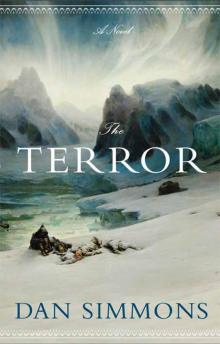 The Terror
The Terror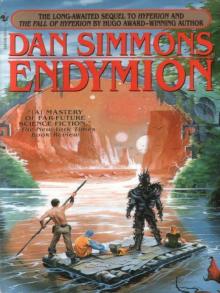 Endymion
Endymion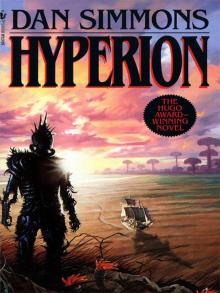 Hyperion
Hyperion The Crook Factory
The Crook Factory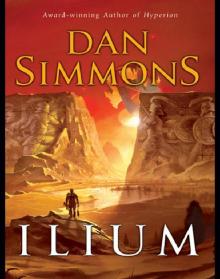 Ilium
Ilium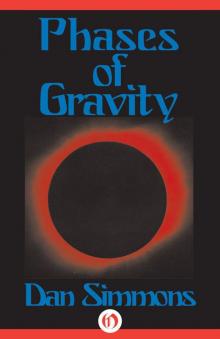 Phases of Gravity
Phases of Gravity Hardcase
Hardcase Fires of Eden
Fires of Eden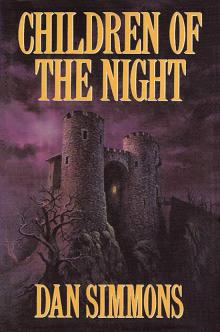 Children of the Night
Children of the Night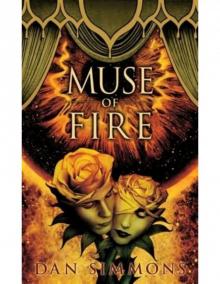 Muse of Fire
Muse of Fire Drood
Drood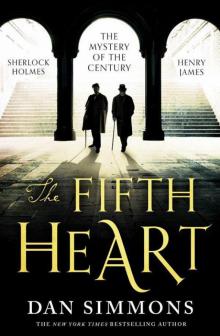 The Fifth Heart
The Fifth Heart Carrion Comfort
Carrion Comfort The Hollow Man
The Hollow Man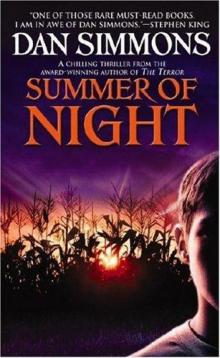 Summer of Night
Summer of Night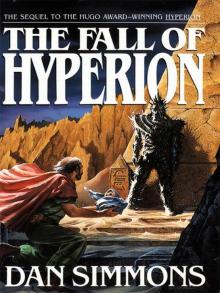 The Fall of Hyperion
The Fall of Hyperion Black Hills
Black Hills A Winter Haunting
A Winter Haunting Hard Freeze
Hard Freeze Prayers to Broken Stones
Prayers to Broken Stones Hard as Nails
Hard as Nails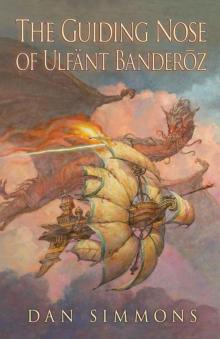 The Guiding Nose of Ulfant Banderoz
The Guiding Nose of Ulfant Banderoz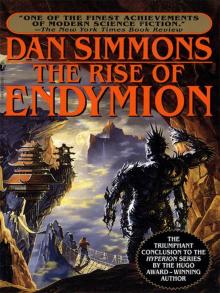 The Rise of Endymion
The Rise of Endymion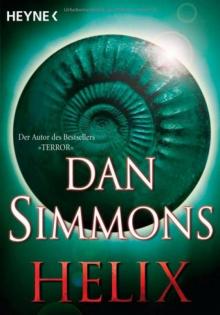 Orphans of the Helix
Orphans of the Helix Lovedeath
Lovedeath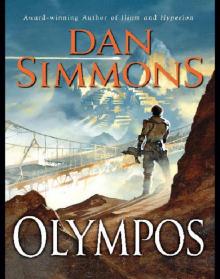 Olympos
Olympos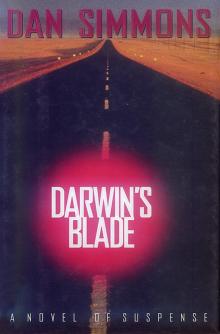 Darwin's Blade
Darwin's Blade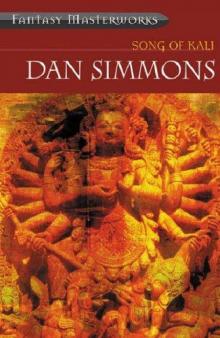 Song of Kali
Song of Kali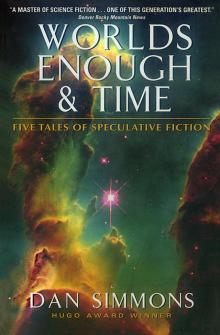 Worlds Enough & Time: Five Tales of Speculative Fiction
Worlds Enough & Time: Five Tales of Speculative Fiction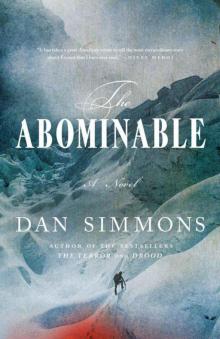 The Abominable
The Abominable The Death of the Centaur
The Death of the Centaur Hard as Nails jk-3
Hard as Nails jk-3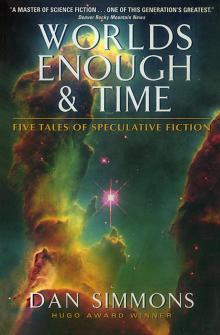 Worlds Enough & Time
Worlds Enough & Time Joe Kurtz Omnibus
Joe Kurtz Omnibus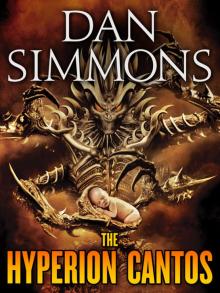 The Hyperion Cantos 4-Book Bundle
The Hyperion Cantos 4-Book Bundle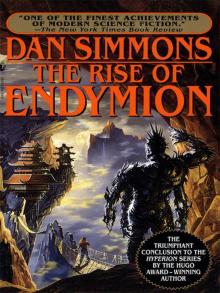 Rise of Endymion
Rise of Endymion Hard Freeze jk-2
Hard Freeze jk-2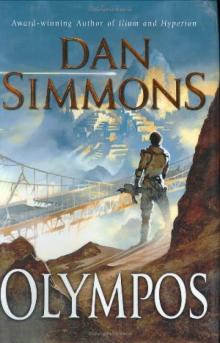 Olympos t-2
Olympos t-2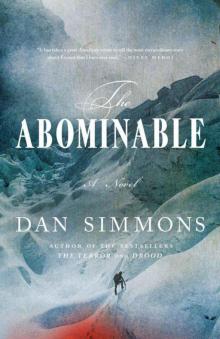 The Abominable: A Novel
The Abominable: A Novel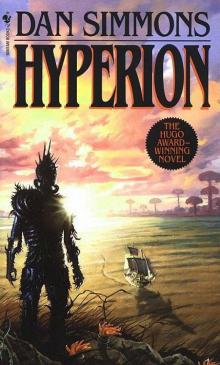 Hyperion h-1
Hyperion h-1 Remembering Siri
Remembering Siri Black Hills: A Novel
Black Hills: A Novel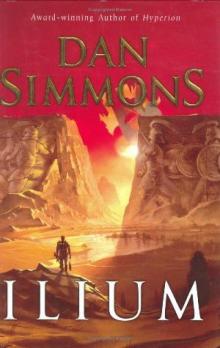 Ilium t-1
Ilium t-1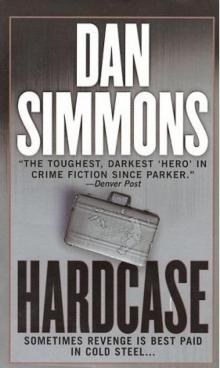 Hardcase jk-1
Hardcase jk-1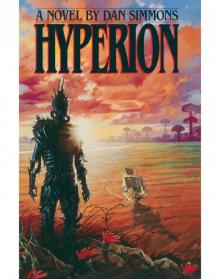 Hyperion 01 - Hyperion
Hyperion 01 - Hyperion